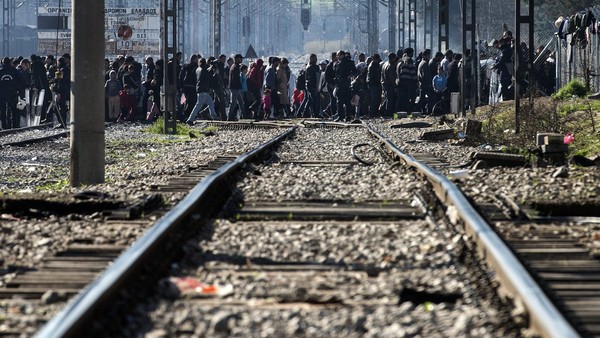Results 1 to 1 of 1
Thread Information
Users Browsing this Thread
There are currently 1 users browsing this thread. (0 members and 1 guests)
-
03-09-2016, 11:23 AM #1
UN warns on legality of EU deal to return migrants to Turkey
Duncan Robinson in Brussels
A crucial deal to send all non-Syrian migrants back to Turkey from Greece is likely to be illegal, according to the UN’s refugee agency and other refugee groups who criticised the idea.
Officials from the EU are banking on an agreement with Turkey that would result in people fleeing war in places such as Afghanistan and Iraq being quickly returned to Turkey — despite concerns over the state of the country’s asylum system.
Questions over the plan’s legality could overshadow a meeting of EU leaders with Turkey in Brussels on Monday, when the deal is likely to be finalised.
Another point of contention is likely to be the Turkish government’s seizure on Friday of Zaman, the country’s largest opposition media group.
Donald Tusk, the European Council president, and Jean-Claude Juncker, the European Commission president, are anxious that any EU criticism of creeping authoritarianism in Turkey could hamper the refugee talks.
At a meeting over the weekend in Brussels, several EU ambassadors criticised Turkey’s actions against Zaman, and called for the matter to be raised with the Turkish prime minister at the summit.
Both Berlin and Brussels have thrown their weight behind securing a deal with Turkey, including the migrants return scheme, as they become increasingly desperate to reduce the number of people crossing the Aegean.
Although Turkey is a signatory of the Geneva Convention on refugees, Ankara only applies the rules to European citizens, meaning that Iraqis and Afghans have few rights to shelter in the country.
Anneliese Baldaccini, an asylum expert at Amnesty International, said that the agreement would be “directly at odds” with the EU’s own asylum rules. So-called “pushbacks”, where asylum seekers are returned to a country without having their application processed properly, are banned under the bloc’s asylum code.
Under the proposals, any non-Syrian refugee or migrant picked up in Greek territory would be returned to Turkey. Judith Sunderland, associate director for Human Rights Watch, said: “Anyone rescued in Greek waters should be taken to Greece — EU law is clear on that. Helping Turkey prevent people from leaving violates basic principles in refugee and human rights law.”
“Let’s see what the European courts has to say on this,” said Vincent Cochetel, who is leading the UNHCR’s response to the crisis in Europe.
A deal might be legal if Turkey overhauls its asylum system and guarantees that those returned are not kept in detention and are given a proper chance of claiming refuge, which is not currently the case, says Mr Cochetel. Other than Europeans, only Syrians have any right to claim shelter in Turkey under its current system.
Nato on Sunday said it was extending its maritime patrols against people smugglers in the Aegean into Greek and Turkish territorial waters
In total, 126,000 migrants have entered Greece via the Aegean so far this year. Across the whole Mediterranean, more than 400 people have died this year — outstripping the death rate in 2015, which was the worst for fatalities.
The legal warnings came as Brussels called on member states to lift border controls by the end of the year in a push to get the bloc’s passport-free area functioning again after it buckled under the refugee crisis.
The European Commission warned that the permanent reintroduction of border controls would cost between €5bn and €18bn a year in estimated losses because of lower tourism and delays for freight at borders.
Border controls sprang up across the bloc’s passport-free zone in 2015 after the system collapsed under the pressure of 1.2m asylum seekers seeking refuge in the bloc — the highest total and more than double the number in 2014, according to figures from Eurostat.
Dimitris Avramopoulos, the European Commission’s migration chief, said that it was vital for the EU to secure its external border and warned that Greece must fix the “serious deficiencies” at its external border. Nearly 1m have entered the EU through Greece since the start of 2015.
The European Commission confirmed that it will come forward with proposals for the bloc’s rules on who is responsible for asylum seekers on March 16, after the refugee crisis resulted in the near-total breakdown of the current system, known as the “Dublin regulation”.
In total, people fleeing war in Iraq, Afghanistan and Syria accounted for nearly 700,000 applications last year, with Syrians counting for more than half. Others came from countries such as Kosovo, Albania and Nigeria, and are generally not granted protection, but must still have their applications processed.
Germany had by far the highest number of applications, with 441,800 people claiming asylum in the country, according to figures from the EU’s statistics agency, which often lags behind national statistics offices. The huge number of applications created a backlog of nearly 1m applications.
UN warns on legality of EU deal to return migrants to Turkey - FT.com
Similar Threads
-
Turkey denies U.S. base deal in place for battle against Islamic State
By HAPPY2BME in forum Other Topics News and IssuesReplies: 0Last Post: 10-13-2014, 10:10 PM -
IRS Warns: Obamacare Tax Must Be Paid with Tax Return
By HAPPY2BME in forum General DiscussionReplies: 6Last Post: 04-07-2014, 10:40 AM -
Iran & Turkey Agree To Uranium Swap In Nuclear Deal
By carolinamtnwoman in forum Other Topics News and IssuesReplies: 0Last Post: 05-17-2010, 12:45 PM -
Legality of Huckabee's Mexican consulate deal questioned
By MyAmerica in forum General DiscussionReplies: 2Last Post: 12-11-2007, 09:49 PM -
Legality of Huckabee's Mexican consulate deal questioned
By zeezil in forum illegal immigration News Stories & ReportsReplies: 1Last Post: 11-01-2007, 03:13 PM


 LinkBack URL
LinkBack URL About LinkBacks
About LinkBacks





 Reply With Quote
Reply With Quote

Listen to William Gheen on Rense Apr 24, 2024 talking Invasion...
04-25-2024, 02:03 PM in ALIPAC In The News